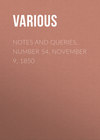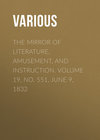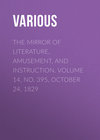Loe raamatut: «International Weekly Miscellany of Literature, Art, and Science — Volume 1, No. 4, July 22, 1850», lehekülg 5
"What most offended them was the manner in which the Prince announced his resolution. They were in the very act of forming the Administration, filling offices, &c., &c., when Adam came in from the Prince. They said they could not be disturbed; he said he must disturb them, for he had a message from the Prince: they replied that it was for the Prince they were at work, for they were making the Government; Adam told them to spare all trouble, for no Government was to be made. This was on Friday the 1st, in the evening; and what affronted them was, that after having had such a task committed to them, the Prince should have presumed to take a counter resolution by himself without first consulting them."
This is a characteristic trait of the Duke of Wellington's way of getting through, business.
"He was fond of relating, that soon after the Duke's appointment, he was leaving his office at the usual hour, when, on coming out at the Park entrance, he perceived his new chief just in the act of getting on horseback. He went up to the Duke, and mentioned that there were some matters connected with the department on which he would like to communicate with him when he had time. 'No time like the present,' said the Duke, and, at once dismissing his horse, returned with Mr. Ward into the Ordnance Office. There, then, he remained closeted with the Duke till past eight, listening to and answering his pertinent queries upon manifold points connected with the department. From that moment the Duke appeared to be au fait of the business in hand, and ready to cope with the details as they from time to time presented themselves."
The Duke seems to have been more alarmed at the state of the nation about 1819 than the nature of the case justified; deceived, probably, by the official "reports" of Messrs. Castles and Co. The following remark, however, exhibits his penetration:
"He said, if the rising broke out anywhere, it would be at Glasgow and Paisley; where many rich merchants and all they supported would be sure to suffer, while no one could certainly foretell how soon it might be put down. This led him to his favorite notion, that the loyal should be taught to rely more upon themselves, and less upon the Government, in their own defense against the disloyal. It was this, he thought, that formed and kept up a national character: while every one was accustomed to rely upon the Government, upon a sort of commutation for what they paid to it, personal energy went to sleep, and the end was lost: that in England, he observed, every man who had the commonest independence, one, two, five or six hundred, or a thousand a year, had his own little plan of comfort—his favorite personal pursuit, whether his library, his garden, his hunting, or his farm, which he was unwilling to allow anything (even his own defense) to disturb; he therefore deceived himself into a notion that if there was a storm it would not reach him, and went on his own train till it was actually broke in upon by force. This led to supineness and apathy as to public exertion; which would in the end ruin us: the disposition therefore must be changed, by forcing them to exert themselves; which would not be if Government did everything in civil war, they nothing: hence his wish for a volunteer force. All this was exceedingly sound, and showed the reach of his reflecting mind as an observer of human nature, as well as a statesman and soldier, more than anything I have yet seen."
There is a curious passage touching Pitt's dying moments.
"At the time Mr. Ward accepted the post of Under-Secretary of State, (resigning that of Welsh Judge,) it had been promised him that the apparent risk of such a step to the future prospects of his family should be guarded against by the grant of a pension, to commence when he should cease to hold office. He had been but a year in the post thus accepted, and amid the pressure of other matters the contemplated arrangement had never been completed. More than once in his last illness did Pitt allude to his unfulfilled promise, and speak with kindness of him to whom it had been made. Later on, when he could no longer continuously articulate, he made the name 'Robert Ward' audible, and added signs for paper and ink. His trembling hand having feebly traced a number of wandering characters, and added what could be easily recognized as his well-known signature, he sank back. The precious paper (precious, whatever may have been its unknown import, as a proof of remembrance at so solemn a moment) was afterward handed over by the physician in attendance, Sir Walter Farquhar, to Mr. Ward; and many a time did he declare, as he displayed it to me, that he would give anything he valued most in the world to be able to decipher its unformed characters."
Some posthumous compositions of Mr. Ward are appended to the Memoirs. They consist of "characters," similar to those of Chesterfield and other writers, and of "sketches" and essays; these last being set in a species of framework, intended to connect them into a series. They are not the best specimens of the author's composition; and perhaps were hardly worth publication. Allowance is to be made, as Mr. Phipps remarks, for their unrevised state; and revision might have removed crudities and imparted more closeness and strength. It would not, however, have altered their main defects; which may be summed up by saying that they belonged to another age, without reaching the peculiar force and finish which alone can give interest to an obsolete mode.
THE BAGPIPE.—In Gothic sculpture and tracery angels are sometimes portrayed practising on the bagpipe. It was occasionally used in churches before the introduction of the organ, which occurred early in the fifteenth century. Written music came into use about the same time, and both were loudly denounced by many of the old school-men as unnecessary and vain innovations.
THE IVORY MINE:
A TALE OF THE FROZEN SEA
I.—YAKOUTSK
Yakoutsk is one of the principal cities of Siberia, a country the name of which excites exaggerated ideas of sterility and desolation. Watered by rivers, which in every direction do the work of railways, with richly-wooded mountains and valleys, with green slopes, cultivated fields, soft meadows, gardens, and grassy islands in the great streams, with all the common vegetables in pretty fair abundance, with an endless source of commerce in furs and ivory, Siberia, except in its extreme northern provinces, presents, like most other lands, a very considerable amount of compensation for considerable rigor of climate. Yakoutsk is a completely northern town on the great river Lena, with wide streets and miserable huts, all of wood, in many of which ice is still used in winter for panes of glass. A very eminent traveler tells us that on his visit there were 4000 people living in 500 houses; with three stone churches, two wooden ones, and a convent. It had once an antiquity to show—the ancient Ostrog or fortress built in 1647 by the Cossacks; but which menaced ruin more and more every day, being not of stone, but of wood, and at last disappeared. Even here progress is observable, and wretched cabins give way gradually to houses, some of which are even elegantly arranged in the interior. It is a great commercial center: from the Anubra to Behring's Straits, from the banks of the Frozen Sea to Mount Aldana, from Okhotsk and even Kamschatka, goods are brought hither, consisting chiefly of furs, seals' teeth and mammoths' tusks, which afford excellent ivory, all of which are sold in the summer to itinerant traders, who give in return powerfully-flavored tobacco, corn and flour, tea, sugar, strong drinks, Chinese silks and cottons, cloth, iron and copper utensils, and glass.
The inhabitants of the town are chiefly traders, who buy of the Yakouta hunters their furs at a cheap rate, and then sell them in a mysterious kind of fashion to the agents who come from Russia in search of them. During the annual fair they stow up their goods in private rooms; and here the Irkoutsk men must come and find them. These traders are the Russian inhabitants, the native Yakoutas being the only artisans. In this distant colony of the human race, the new-born child of a Russian is given to a Yakouta woman to nurse, and when old enough, learns to read and write, after which he is brought up to the fur trade, and his education is finished.
Ivan Ivanovitch was a young man born and bred at Yakoutsk. His parents had given him the usual amount of tuition, and then allowed him for a time to follow the bent of his inclination. Ivan took to the chase. Passionately fond of this amusement, he had at an early age started with the Yakouta trappers, and become learned in the search for sables, ermines, and lynxes; could pursue the reindeer and elk on skates; and had even gone to the north in quest of seals. He thus at the age of twenty, knew the whole active part of his trade, and was aware of all the good hunting-grounds on which the Siberians founded their prosperity. But when he was called on to follow the more quiet and sedentary part of his occupation, he was not one-half so quick. His rough and rude life made town existence distasteful to him, and he evinced all that superb contempt for shop-keeping which characterizes the nomadic man, whether Red Indian, Arab, Tartar, or Siberian.
But Ivan was told he must make his way in the world. His parents who died before he attained to manhood, left him a small fortune in rubles and furs, which, if he chose to be industrious and persevering, might pave the way to the highest position in his native town. Acting on the pressing advice of his friends, he gave up his wanderings, and went to reside in the house of his fathers, piled up his skins and ivory, bought new ones, and prepared for the annual fair. The merchants from Irkoutsk, the capital, came, and Ivan, who was sharp and clever, did a good trade. But when his furs and teeth were changed into tea, tobacco, brandy, cloth, &c., he did not feel a whit happier. Ivan longed for the arid hills, and lofty mountains, and pellucid lakes—for the exciting hunt and the night bivouac, when gray-headed Yakoutas would, with their ganzis—the Irish duddeen—in their mouths, tell terrible and wonderful stories of ancient days. When eating town fare, his stomach yearned after frozen Yakouta butter, cut up with axes, and for strouganina or frozen fish, with reindeer brains, and other northern delicacies. And then his kind friends told him that he wanted a wife—a possession without which, they assured him, life was dull, adding that in her society he would cease to long for communion with bears and savages.
Ivan believed them, and, following their advice, launched into society—that is, he went more than usual to the noisy festivities of the town, which form the occupation of the dull season. The good people of Yakoutsk—like all people approaching to a savage state, especially in northern climes—consider eating the great business of life. Fabulous legends are told of the enormous capacity for food, approaching that of the Esquimaux; but however this may be, certain it is that a Yakoutsk festival was always commenced by several hours of laborious eating and drinking of fat and oily food and strong brandy. When the utmost limits of repletion were reached, the patriarchs usually took to pipes, cards, and punch, while the ladies prepared tea, and ate roasted nuts, probably to facilitate digestion. The young men conversed with them, or roasted their nuts for them, while perhaps a dandy would perform a Siberian dance to the music of the violin or gousli, a kind of guitar. Ivan joined heartily in all this dissipation: he smoked with the old men; he drank their punch; he roasted nuts for the ladies, and told them wonderful stories which were always readily listened to, except when some new fashion, which for several years before had been forgotten in Paris—found its way via St. Petersburgh, Moscow, and Irkoutsk, to the deserts of Siberia. Then he was silent; for the ladies had ample subject of discourse, not forgetting the great tea-table topic—scandal; causing the old men to shake their heads, and declare such things were not when they were young. Ivan, however, had one unfailing subject of popularity with the ladies. Like most Russians who have had occasion to travel much in cold places, he relished a cup of tea even better than the punch, as he had learned by experience that there was more genuine warmth in the pot than in the bowl. Most Russian officers are known to share this opinion.
Ivan had several times had his attention directed to Maria Vorotinska, a young and rich widow, who was the admiration of all Yakoutsk. Her husband had left her a fortune in knowledge of the fur trade and in rubles, with a comfortable house nicely furnished, in Siberia the very height of human felicity. It was commonly reported that Maria, young as she was, was the best bargainer in the land. She got her skins for less than anybody else, and sold them for a higher price. With these qualifications, she must, it was said, prove a jewel to Ivan, who was not a close buyer nor a hard seller. But Ivan for some time remained perfectly insensible both to these social advantages and the great beauty of the lady. He met her often, and even roasted her more nuts than any one else, which was a strong case of preference; but he did not seem caught in the fair one's toils. He neither ate, nor slept, nor amused himself one whit the less than when he first knew her. One evening, however, as Maria handed him his tea, with a hot cake, Ivan, whether owing to some peculiar smile on her face, or to the domestic idea which the act suggested, seemed certainly very much struck, and next day formally proposed. Maria laughed, and tossed her head, and spoke a few good-natured words; and then, without either accepting or rejecting him, hinted something about his youth, his want of devotion to business, and his want of fortune. Ivan, a little warmly, declared himself to be the best hunter in Yakoutsk, and hence the most practically-experienced of any in the trade, and then gave the sum-total of his possessions.
"Just one quarter of what good old Vorotinska left me!" replied the prudent Maria.
"But if I liked," replied Ivan, "I could be the richest merchant in Siberia."
"How?" asked Maria a little curiously, for the mere mention of wealth was to her like powder to the war-horse.
"Being almost the only Russian who has lived among the Yakoutas, I know the secret of getting furs cheaper and easier than any one else. Beside, if I chose to take a long journey, I could find ivory in vast heaps. A tradition is current of an ivory mine in the north, which an old Yakouta told me to be truth."
"Very likely," said Maria, to whom the existence of the fossil ivory of the mammoth in large masses was well known; "but the promich lenicks—trading companies—have long since stripped them."
"Not this," cried Ivan; "it is a virgin mine. It is away, away in the Frozen Sea, and requires courage and enduring energy to find. Two Yakoutas once discovered it. One was killed by the natives; the other escaped, and is now an old man."
"If you could find that," said Maria, "you would be the first man in Siberia, and the Czar himself would honor you."
"And you?" asked Ivan humbly.
"Ivan Ivanovitch," replied Maria calmly, "I like you better than any man in Yakoutsk, but I should adore the great ivory merchant."
Ivan was delighted. He was a little puzzled by the character of the lady, who, after marrying an old man for his fortune, seemed equally desirous of reconciling her interest and her affections in a second marriage. But very nice ideas are not those of the half-civilized, for we owe every refinement both of mind and body to civilization, which makes of the raw material man—full of undeveloped elements—what cooking makes of the potato root. Civilization is the hot water and fire which carry off the crudities, and bring forth the good qualities.
However this maybe, Ivan nursed his idea. Apart from the sudden passion which had invaded him, he had long allowed this fancy to ferment in his brain. During his wandering evenings, a noted hunter named Sakalar, claiming descent from the supposed Tartar founder of the Yakoutas, had often narrated his perilous journey on sledges across the Frozen Sea, his discovery of an ivory mine—that is, a vast deposit of mammoths' tusks, generally found at considerable depth in the earth, but here open to the grasp of all. He spoke of the thing as a folly of his youth, which had cost the life of his dearest friend, and never hinted at a renewed visit. But Ivan was resolved to undertake the perilous adventure, and even to have Sakalar for his guide.
II. THE YAKOUTA HUNTER
Ivan slumbered not over his project. But a few days passed before he was ready to start. He purchased the horses required, and packed up all the varied articles necessary for his journey, and likely to please his Yakouta friend, consisting of tea, rum, brandy, tobacco, gunpowder, and other things of less moment. For himself he took a couple of guns, a pair of pistols, some strong and warm clothes, an iron pot for cooking, a kettle for his tea, with many minor articles absolutely indispensable in the cold region he was about to visit. All travelers in the north have found that ample food, and such drinks as tea, are the most effectual protection against the climate; while oily and fat meat is also an excellent preservative against cold. But Ivan had no need to provide against this contingency. His Yakouta friend knew the value of train-oil and grease, which are the staple luxuries of Siberians, Kamschatkans, and Esquimaux alike.
The first part of Ivan's journey was necessarily to the yourte, or wigwam of Sakalar, without whom all hopes of reaching the goal of his wishes were vain. He had sufficient confidence in himself to venture without a guide toward the plain of Miouré, where his Yakouta friend dwelt. He started at early dawn, without warning of his departure any one save Maria, and ventured courageously on the frozen plain which reaches from Yakoutsk to the Polar Sea. The country is here composed of marshes, vast downs, huge forests, and hills covered with snow in the month of September, the time when he began his journey. He had five horses, each tied to the tail of the one before him, while Ivan himself was mounted on the first. He was compelled to ride slowly, casting his eyes every now and then behind to see that all was right. At night he stretched a bearskin under a bush, lit a huge fire, cooked a savory mess, and piling clothes over himself, slept. At dawn he rose, crammed his kettle full of clean snow, put it over the embers, and made himself tea. With this warm beverage to rouse him, he again arranged his little caravan, and proceeded on his way. Nothing more painful than this journey can be conceived. There are scarcely any marks to denote the road, while lakes, formed by recent inundations, arrest the traveler every half hour, compelling him to take prodigious rounds, equally annoying and perplexing.
On the morning of the third day Ivan felt a little puzzled about the road. He knew the general direction from the distant mountains, and he wished to avoid a vast morass. Before him was a frozen stream, and on the other side a hillock. Leaving the others to feed as well as they could, he mounted his best horse, and rode across. The ice bent under him as he went, and he accordingly rode gently; but just as he reached the middle, it cracked violently right across, and sank visibly under him. Ivan looked hurriedly round him. The ice was everywhere split, and the next minute his horse, plunging violently, fell through. Instead, however, of falling into a stream of cold water, Ivan found himself in a vast and chilly vault, with a small trickling stream in the middle, and at once recollected a not unfrequent phenomenon. The river had been frozen over when high with floods, but presently the water sinking to its ordinary level, the upper crust of ice alone remained. But Ivan had no desire to admire the gloomy, half-lit vault, extending up and down out of sight; but standing on his horse's back, clambered up as best he might upon the surface, leaving the poor animal below. This done, he ran to the shore, and used the well-remembered Yakouta device for extracting his steed: he broke a hole in the ice near the bank, toward which the sagacious brute at once hurried, and was drawn forth. Having thus fortunately escaped a serious peril, he resumed his search on foot, and about midday pursued his journey.
A few hours brought him to the curious plain of the Miouré, where he expected to find the camp of his friend Sakalar. Leaving an almost desert plain, he suddenly stood on the edge of a hollow, circular in form and six miles across, fertile in the extreme, and dotted with numerous well-stocked fish-ponds. The whole, as may plainly be seen, was once a lake. Scattered over the soil were the yourtes of the Yakoutas, while cattle and horses crowded together in vast flocks. Ivan, who knew the place well, rode straight to a yourte or cabin apart from the rest, where usually dwelt Sakalar. It was larger and cleaner than most of them, thanks to the tuition of Ivan and the subsequent care of a daughter, who, brought up by Ivan's mother while the young man wandered, had acquired manners a little superior to those of her tribe.
This was really needful, for the Yakoutas, a pastoral people of Tartar origin, are singularly dirty, and even somewhat coarse and unintellectual—like all savage nations, in fact, when judged by any one but the poet or the poetic philosopher, who, on examination, will find that ignorance, poverty, misery, and want of civilization, produce similar results in the prairies of America and the wilds of Siberia, in an Irish cabin, and in the wynds and closes of our populous cities. But the chief defect of the Yakouta is dirt. Otherwise he is rather a favorable specimen of a savage. Since his assiduous connection with the Russians he has become even rich, having flocks and herds, and at home plenty of koumise to drink and horse's flesh to eat. He has great endurance, and can bear tremendous cold. He travels in the snow, with his saddle for a pillow, his horse-cloth for a bed, his cloak for a covering, and so sleeps. His power of fasting is prodigious, and his eyesight is so keen that a Yakouta one day told an eminent Russian traveler that he had seen a great blue star eat a number of little stars, and then cast them up. The man had seen the eclipses of Jupiter's satellites. Like the red Indian, he recollects every bush, every stone, every hillock, every pond necessary to find his way, and never loses himself, however great the distance he may have to travel.
His food is boiled beef and horse's flesh, cow's and mare's milk. But his chief delicacy is raw and melted fat, while quantity is always the chief merit of a repast. He mixes likewise a mess of fish, flour, milk, fat, and a kind of bark, the latter to augment the volume. Both men and women smoke inordinately, swallowing the vapor, as do many dwellers in civilized lands—a most pernicious and terrible habit. Brandy is their most precious drink, their own koumise having not sufficient strength to satisfy them. In summer they wander about in tents collecting hay, in winter they dwell in the yourte or hut, which is a wooden frame, of beehive shape, covered with grass, turf, and clay, with windows of clear ice. The very poor dig three feet below the soil; the rich have a wooden floor level with the adjacent ground, while rude benches all round serve as beds, divided one from the other by partitions. The fireplace is in the middle, inclining toward the door. A pipe carries away the smoke.
It was almost dark when Ivan halted before the yourte of Sakalar. It was at once larger and cleaner to the eye than any of those around. It had also numerous outhouses full of cows, and one or two men to tend these animals were smoking their pipes at the door. Ivan gave his horses to one of them, who knew him, and entered the hut. Sakalar, a tall, thin, hardy man of about fifty, was just about to commence his evening meal. A huge mass of boiled meat, stewed fish, and a sort of soup, were ready; and a young girl about eighteen, neatly dressed, clean, and pretty—all owing to her Yakoutsk education—was serving the hunter.
"Spirit of the woods protect me!" shrieked the girl, spilling half of the soup upon the floor.
"What wild horses have you seen, Kolina?" cried the hunter, who had been a little scalded; and then seeing Ivan, added, "A Yakouta welcome to you, my son! My old heart is glad, and I am warm enough to melt an iceberg at the sight of you, Ivan. Kolina, quick! another platter, a fresh mug, the best bottle of brandy, and my red pipe from Moscow!"
No need was there for the hunter to speak. Kolina, alert as a reindeer, had sprung up from the low bench, and quickly brought forth all their holiday ware, and even began to prepare a cake, such as Ivan himself had taught her to make, knowing that be liked some sort of bread with his meals.
"And where are you going?" cried Sakalar when the young man had somewhat appeased his hunger.
"To the North Sea, in search of the great ivory mine!" said Ivan, abruptly.
Kolina started back in terror and surprise, while Sakalar fixed his keen eye on the youth with sorrow and curiosity, and almost unequivocally, testified his belief that his favorite pupil in the chase was mad. But Ivan rose and bade the serving-man of the rich Yacouta bring in his boxes, and opened up his store of treasures. There was tea for Kolina; and for Sakalar, rum, brandy, powder, guns, tobacco, knives—all that could tempt a Yakouta. The father and daughter examined them with pleasure for some time, but presently Kolina shook her head.
"Ivan," said Sakalar, "all this is to tempt the poor Yakouta to cross the wilderness of ice. It is much riches, but not enough to make Sakalar mad. The mine is guarded by evil beings. But speak, lad, why would you go there?"
"Let Kolina give me a pipe and I will tell my story," said Ivan; and filling his glass, the young fur-trader told the story of his love, and his bargain with the prudent widow.
"And this cold-hearted woman," exclaimed Kolina with emotion, "has sent you to risk life on the horrible Frozen Sea. A Yakouta girl would have been less selfish. She would have said, 'Stay at home—let me have Ivan: the mammoth teeth may lie forever on the Frozen Sea!'"
"But the lad will go, and he will be drowned like a dog," said Sakalar, more slowly, after this ebullition of feminine indignation.
"You must go with him, father," continued Kolina, with a compassionate look at Ivan; "and as your child cannot remain alone, Kolina will go too!"
"We will start when the horses have had five days' hay," said Sakalar gravely—the animals alluded to being only fed when about to go a journey—"and Kolina shall go too, for Ivan will be two years on his way."
Ivan listened in amazement: in the first place, at the sudden decision and warmth of his attached friends, with whom he had dwelt twelve years; then at the time required. He felt considerable doubts as to the widow remaining unmarried such a time; but the explanation of Sakalar satisfied him that it was impossible to perform the journey even in two years. The hunter told him that they must first join the tribes dwelling round Nijnei-Kolimsk (New-Kolimsk), where alone he could get dogs and sledges for his journey across the Frozen Sea. This, with the arrangements, would consume the winter. In the summer nothing could be done. When the winter returned he must start toward the north pole—a month's journey at least—and if he hit on the place, must encamp there for the rest of the winter. That summer would be spent in getting out the ivory, fattening up the dogs, and packing. The third winter would be occupied by the journey home. On hearing this, Ivan hesitated; but in describing the journey the spirit of the old hunter got roused, and before night he was warm in his desire to see over again the scenes of his youthful perils. Kolina solemnly declared she must be of the party; and thus these experienced savages, used to sudden and daring resolves, decided in one night on a journey which would perhaps have been talked of half a century elsewhere before it was undertaken.
Kolina slept little that night. In a compartment near her was one who had since childhood been the ideal of her future. She had loved Ivan as a playmate—she loved him as a man; and here, he whom she had longed for all the winter, and he whom she had hoped to see once more the next summer, had suddenly come, starting on a perilous journey of years, to win the hand of an avaricious, but young and beautiful widow. Kolina saw all her fairest dreams vanish, and the idol of her heart crumble into dust. And yet she felt no ill-will to Ivan, and never changed her resolve to be the faithful companion and attendant of her father and his friend in their wild journey to the supposed islands in the Frozen Sea.




















